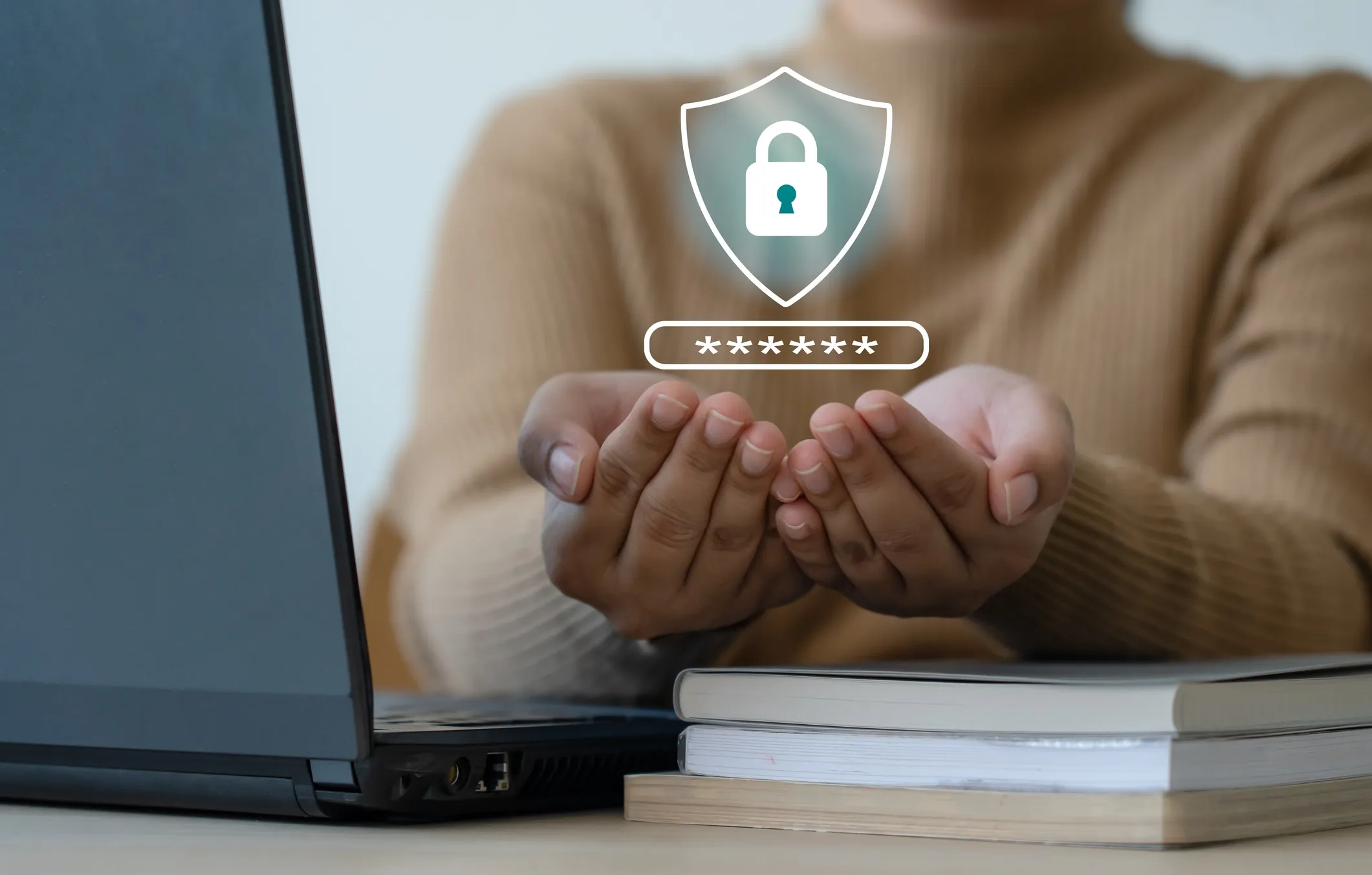In this article:
Identity theft and fraud protection for your finances, personal info, and devices.
Can Someone Steal Your Identity With Your Passport Number?
Passport numbers on their own aren’t particularly valuable pieces of information for identity thieves.
But when a passport is combined with more of your personally identifiable information (PII) — such as your name or address — this can give scammers enough data to target you with sophisticated identity theft scams, access your online accounts, or even create fake IDs in your name.
Cases of forged U.S. passports increased by 69% in 2023 compared to 2022 [*].
Misplaced passports should always be reported immediately to the U.S. State Department online or by completing a DS-64 form. But what should you do if scammers only have your passport number?
How Do Scammers Get Your Passport Number?
You might be able to quickly tell if your passport is missing. But it is much more difficult to ascertain if your passport number (or even a scan of it) has been leaked.
Here are a few of the most common ways that your passport number can be compromised:
- Data breaches at hotels, airlines, and other travel companies. Companies that store your passport information (or even digital scans of your passport) for security reasons are prime targets for hackers. For example, the 2019 Marriott breach exposed millions of passport numbers online [*].
- Bogus passport renewal websites. Fraudsters create fake passport renewal sites with the promise of “expediting” your new passport. If you enter your details, they go straight to the scammer. Note: USA.gov is the only legitimate website on which you can renew your passport.
- Phishing scams. To gain trust, scammers commonly target victims with fake emails that impersonate legitimate organizations. For example, fraudsters often pose as travel agents and then disappear once victims provide passport details.
- Hacking your email account. If scammers get hold of your email address, they may try to hack into your account — giving them access to sensitive information including your passport details.
- Stealing your physical passport (or application). Anytime you leave your passport unattended, you risk having your passport details stolen. If your passport renewal gets lost in the mail, there’s a possibility it could end up in the wrong hands.
- Shoulder surfing. Always be aware of your surroundings when entering your passport details, especially in public. It’s not unheard of for criminals to simply look over someone’s shoulder and steal information without their victim knowing.
What Can Someone Do With Your Passport Number (or a Scan)?
- Gain access to your bank account
- Build a “synthetic identity” by using your ID
- Apply for government benefits in your name
- Open fraudulent accounts in your name
- Travel to other countries under your name
- Create a forged passport
- Target you (or your loved ones) with sophisticated scams
- Commit employment fraud
In most cases, scammers need more than just your passport number to steal your identity or pull off scams. However, your passport number alone could give them an easy way to look up more leaked information about you on the Dark Web.
It’s even worse if a scan of your passport is leaked, as that includes your full name, date of birth, and a photo.
Here are eight real dangers of having your passport number or scan leaked:
1. Gain access to your bank account
Hackers can use your passport information to source other sensitive data leaked on the Dark Web — such as your Social Security number (SSN).
With this data in hand, they can contact your bank and attempt to gain access to your account, make themselves an authorized user, or even transfer money out of your savings.
In one case, a North Texas man stole $1.9 million from Chase bank customers by creating fake passports with their identifying information and then opening fraudulent joint accounts in their names [*].
2. Build a “synthetic identity” by using your ID
Synthetic identity fraud happens when criminals create a new, falsified identity by combining real personal information from multiple victims — such as passport numbers — with fake details.
This type of fraud can be difficult to trace, making it especially attractive to criminals. In fact, U.S. lender exposure to synthetic identities has grown to nearly $3 billion [*].
📚 Related: What Is Synthetic Identity Fraud? (How To Protect Yourself) →
3. Apply for government benefits in your name
Scammers can use your passport number or a scanned copy of your passport to apply for government benefits, such as unemployment insurance and Social Security disbursements.
If imposters succeed in obtaining your benefits, those benefits are usually sent to a bank account that the scammers control. Not only will you never see the benefits — you could be held responsible for any repercussions that may occur.
4. Open fraudulent accounts in your name
Rather than trying to gain access to your existing accounts — which can often alert bank employees to fraud — imposters may use your passport number to open a new bank account instead.
The goal is usually to commit money laundering schemes. In other cases, criminals use the new account that’s in your name to deposit fraudulent checks. Then, they withdraw the funds before the bank notices.
That’s exactly what happened when a new Jersey man admitted to using fake passports to deposit phony checks and steal $450,000 from four different banks [*].
📚 Related: Check Deposit Scams: Are You Liable For a Bad Check? →
5. Travel to other countries under your name
Criminals can manipulate passport scans to create legitimate-looking passports that enable them to travel internationally by using your name and information.
Imposters often use stolen or manipulated passports to evade law enforcement. Last year, three men were arrested for supplying falsified passports to more than 50 fugitive criminals — enabling drug traffickers and even murderers to remain on the run [*].
6. Create a forged passport
While scammers might not be able to do much with your passport number alone, if they find out more about you, they can use the information to create a forged physical passport that looks completely legitimate — and with which they can then cause a lot more damage.
In a recent scam, a woman was accused of using fake passports and stolen Social Security numbers to make withdrawals from victims’ bank accounts [*].
📚 Related: Lost Your ID? Here Are the Risks! →
7. Target you with sophisticated scams
If scammers get access to your passport number but don’t have a full scan, their next step will likely be to phish for more information about you. This can come in the form of emails, text messages, or even calls.
For example, they may pose as the U.S. State Department and claim that your passport is due for renewal. They’ll include your passport number and a link that, at first glance, appears legitimate. But when clicked, it takes you to a phishing website or installs malware on your device.
Or, cybercriminals could simply claim that your passport number was stolen and ask you to fill out a form on a website to “secure” your identity — but the website is fake and designed to steal more of your personal information.
8. Commit employment fraud
Employment fraud occurs when someone uses your ID and information to impersonate you when applying for jobs.
Passports, in particular, are attractive to individuals who have criminal records that make it difficult for them to get hired — or those who don’t hold citizenship in a particular country. Just two years ago, a mental health nurse was exposed for fraudulently working at a U.K. hospital using a fake passport [*].
With your passport number, they’ll be able to pass background checks — but if they manage to get employment under your name, it could cause major problems for you later if you ever need to apply for government benefits.
Was Your Passport Number Leaked? Do This!
- Confirm that your passport was compromised. You may receive a data breach notification telling you that your passport information was leaked. In other cases, you might need to check for yourself by using a Dark Web monitoring service to alert you if your passport data appears on a Dark Web forum or marketplace.
- Look for the warning signs of identity theft. Beware of unexpected credit report changes, unfamiliar charges on your bank statements, strange calls from debt collectors, or suspicious login attempts to your social media and other online accounts.
- File an identity theft report with the FTC. If a scammer knows your passport number, it won’t be difficult to gather enough information about you to steal your identity. If this happens, file an identity theft report with the Federal Trade Commission at IdentityTheft.gov to get assistance with a recovery plan.
- Freeze your credit with all three bureaus. Freezing your credit prevents fraudsters from being able to obtain new credit in your name. You’ll need to contact each of the three bureaus individually — Experian, Equifax, and TransUnion — to request a freeze.
- Secure your online accounts with 2FA and updated recovery email addresses. Ensure that your online accounts are secured — especially your financial accounts. Enable two-factor authentication (2FA) whenever possible, and confirm that your recovery email addresses are current.
- Monitor your credit and bank statements for signs of fraud. The faster you catch suspicious activity on your bank statements, the better chance you have of recovering lost funds. Generally, it’s a good idea to review your statements weekly; but if you know your passport has been compromised, review statements more frequently.
- Beware of phishing scams (emails, texts, calls, etc.). Scammers can use your passport to create fake data breach notifications or even convince you that your passport was stolen. From there, they usually send you to fake websites and ask for even more personal information — which then goes directly to the scammer.
- Scan the Dark Web for more leaked data. If your passport number was leaked, there’s a good chance more information about you is floating around on the Dark Web. For optimal security, sign up for a Dark Web monitoring service like Identity Guard for continual, automatic scans. You’ll also receive notifications if any other data of yours is leaked.
- Consider signing up for identity theft protection. A digital security solution like Identity Guard can take the work out of monitoring your passport and other sensitive information. Plus, you get access to other cybersecurity features including a secure password manager and Safe Browsing tools.
The Bottom Line: A Leaked Passport Number Can Put Your Identity at Risk
Having your passport number compromised isn’t a reason to panic, but it can lead to serious consequences if not properly addressed.
Keep your passport locked away when not in use, and be diligent about not giving out your passport number (or scans of it) too easily — many hotel chains and other businesses accept alternative forms of ID instead.
But even with your best efforts, your passport number could still get leaked in a data breach.
For extra peace of mind, consider investing in an identity theft protection service like Identity Guard.
Every Identity Guard plan comes with 24/7 U.S.-based identity monitoring, Dark Web scans, and data breach notifications that alert you quickly to signs of fraud. And if the worst does happen, Identity Guard provides $1 million in insurance to help you restore your identity.



